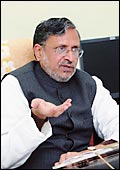|
As
the hammer of the pink tower clock on the roof of the Bihar state
secretariat building strikes the gong 11 times, its echoes reverberate
through the labyrinthine colonial era building. Deep down in its
bowels, state Chief Secretary A.K. Choudhary and a team of bureaucrats
are closeted in a video conferencing room witnessing a demonstration
by a Gurgaon-based firm that is pitching for a contract to link
up various departments and offices across the state through a
Wide Area Network (wan). On the ground floor, Development Commissioner
R. Jaymohan Pillai is poring over the proposals of companies that
have expressed interest in setting up shop in the state. "We
have to clear them within 30 days," he says. And Sushil Kumar
Modi, Deputy Chief Minister and Finance Minister, just back from
a meeting with bankers, is already into his next one-to work out
incentives for potential investors and to determine the extent
of credit flows to rev up the rural economy.
"Economic development cannot take place
in a vacuum. So, along with industry, we are also looking at ways
to develop the rural sector," says Nitish Kumar, who took
over as Chief Minister of Bihar in November, 2005 (See Bihar is
no Longer Lawless). He is setting his goals very high: the state's
approach paper to the 11th Five Year Plan says: "An investment
of Rs 1,66,593 crore will be required for Bihar to achieve a growth
rate of 8.5 per cent." For the moment, though, he still presides
over a state synonymous with potholed roads, lantern-lit villages,
crime-infested streets and trains, teacher-less schools and abandoned
factories; but that is changing, albeit, very slowly. The government
is aggressively wooing investments, and moving proactively to
improve the state's physical infrastructure and the law and order
situation to create a conducive atmosphere for growth.
BIHAR IS CALLING...
The state government is wooing
investors with a variety of sops and facilities. |
»
Single-window system set up under the chairmanship
of the State Industrial Development Commissioner to clear
industrial projects within 30 days.
» Single-window
system established in every district under the chairmanship
of the District Collector to assist and expedite the setting
up of industrial units. A similar provision has been made
at the level of Industrial Area Development Authorities.
» Rs 200-crore
provision for establishing a land bank.
» Entertainment
tax holiday for multiplexes and cinemas with investments of
at least Rs 1 crore.
» Reduction
in stamp duty on property registration deeds from 8.4 per
cent to 6 per cent.
» "Resurgent
Bihar", an 'invest-fest' being organised in January to
show case investment opportunitites to NRIs.
» An Empowered
Committee under the chairmanship of the state Chief Secretary
and comprising departmental secretaries set up to expedite
decisions on investment proposals.
» Holding
of regular "Open House" sessions with industrialists;
these meetings, chaired by the Chief Minister, will provide
entrepreneurs with a platform to air their grievances with
regard to implementation of their projects and running of
their industries. |
| |
| ...AND INVESTORS ARE RESPONDING |
| The Bihar government has cleared investment
proposals worth Rs 26,000 crore in the last six months. Listed
below are some of the big ones:
NAME OF COMPANY: Indian Gasohol
WHAT IT PROPOSES TO DO: Establish 10 ethanol plants
of 5.4 million tonnes each
INVESTMENT: Rs 13,451 crore
Source: Bihar Government
NAME OF COMPANY: Indian
Gasohol
WHAT IT PROPOSES TO DO: Establish 4 maize processing
units
INVESTMENT: Rs 2,500 crore
NAME OF COMPANY: International
Amusement
WHAT IT PROPOSES TO DO: Develop a mega tourism city
in Patna
INVESTMENT: Rs 1,322 crore
NAME OF COMPANY: Sonalika
WHAT IT PROPOSES TO DO: Set up a tractor production
unit
INVESTMENT: Rs 1,500 crore
NAME OF COMPANY: Idea
WHAT IT PROPOSES TO DO: Set up a cellular network
INVESTMENT: Rs 1,000 crore
|
The first evidence of improvement is visible
in Patna itself-the roads are free of the craters that were politely
described as potholes. And there is a palpable change in the mood
of the state's industrial sector. "Earlier, we lived in fear
of being kidnapped and were regularly harassed by extortionists,"
says Birendra Kumar Mishra, Manager, Rainbow Biscuits, an SME
on the Patna-Bakhtiyarpur Highway, "but thankfully, there
hasn't been a single instance of kidnapping in the last six months."
Says Bihar's Home Secretary Afzal Amanullah: "We have strictly
enforced the law." In the last one year, more than 1,000
hardened criminals have been awarded life sentences.
 |
"We will invest Rs 3,000 crore
on repairing and building roads over the next two years"
Nand Kishore Yadav
Minister for Roads and Tourism |
"The essential prerequisites for attracting
investors is an enabling atmosphere, good law and order, availability
of infrastructure like roads and power and adequate incentives,"
says K.P.S. Kesri, an agro-processor and President of Bihar Industries
Association. "We have already approved 66 proposals worth
more than Rs 26,000 crore," says S. Vijayaraghavan, state
Industries Secretary (see ...And Investors Are Responding). And,
hundreds of brick kilns have mushroomed along the banks of Ganga,
suggesting that Bihar, like the rest of the country, is experiencing
a construction boom.
However, the Opposition, and a section of
the media, has alleged that the government has not delivered on
all that it promised during the election. Modi partially concedes
this debate. "It's just not possible to fulfill our promises
in only one year," he says. "One of our most difficult
tasks was to change the attitude of government servants who had
lost interest in work. But this changed once they were convinced
that we meant business," he adds. Local industrialists corroborate
this claim. "Though the initiatives have not yet borne fruit,
the new team has definitely made a good start," says Kesri.
 |
 |
 |
"Changing the attitude of government
servants was most difficult"
Sushil K. Modi
Deputy CM and Finance Minister |
"We have strictly enforced the law
to halt criminal activities in the state"
Afzal Amanullah
Home Secretary |
"The essential prerequisite for attracting
investors is good law and order"
K.P.S. Kesri
President, Bihar Industries Association |
Having restored a semblance of order in a
lawless state, Kumar's government is now focussing on improving
its road infrastructure. "We will invest Rs 3,000 crore on
repairing and building roads over the next two years," says
Nand Kishore Yadav, Minister for Roads & Tourism. The new,
and improved, network of roads across the state is expected to
provide a fillip to tourism, on which the state is banking heavily
to generate both revenues and employment.
It has drawn up a 20-year Master Plan for
Development of Tourism, which envisages, among other things, the
construction of 40,000 new hotel rooms in the next three years
to cater to seven tourism circuits (Buddhist, Jain, Gandhian,
Sufi, Ramayan, Ecological and Wildlife) that are being developed
in the state. And golf courses are coming up in Bodh Gaya and
Nalanda, to attract both foreign tourists as well as well-healed
Indian travellers.
| "Bihar Is No Longer Lawless" |
 Bihar
Chief Minister Nitish Kumar works 15-16 hours
every day. He took time out from his hectic schedule to talk
to BT's Amit Mukherjee. Bihar
Chief Minister Nitish Kumar works 15-16 hours
every day. He took time out from his hectic schedule to talk
to BT's Amit Mukherjee.
As the CEO of Bihar, what are your plans for the state?
Economic development cannot happen in a social vacuum.
So, along with industry, we are also looking at ways to
develop the rural sector. Our focus is on strengthening
the educational and healthcare infrastructure in the state,
and on providing safe and healthy drinking water. I firmly
believe that we can eradicate 90 per cent of diseases if
we can provide safe drinking water to everyone.
How are you planning to attract investments to Bihar?
Agriculture and heritage tourism are two sectors in which
we have a natural advantage. So, we are focussing on these.
We have received a large number of proposals for setting
up industries based on sugarcane and maize. We have announced
a number of tax concessions and will also provide capital
subsidies of up to Rs 10 crore to attract such units. Then,
we have also received proposals for other industries like
steel, cement and capital goods. There are also two large
NTPCc projects coming up-one in Baar and the other in Kahalgaon
(Bhagalpur). Big groups like the Mahindras are also in touch
with us and negotiations are on with them on setting up
both agro-based and industrial projects in the state. (Tata
Group Chairman) Ratan Tata, who is Chairman of the Investment
Commission of Bihar, is advising us on how to make Bihar
more investor-friendly.
How are you dealing with Bihar's image as a lawless
state?
All that's in the past. Ask any rickshaw puller, taxi
driver, doctor, teacher or contractor, and you will realise
how much the situation has improved on the ground. The occupancy
at the cinema halls during night shows is more than 80 per
cent; that should prove how secure people are in Bihar today.
|
| |
The Incentives
The government has announced a number
of tax concessions to attract investments: |
»
VAT rates reduced on more than 150 items-from 4
per cent to 1 per cent on food grains, from 12.5 to 4 per
cent on LPG, tea, coffee, tractors, tyres, plastic materials,
and several other items.
» Existing
industries exempted from paying electricity duty.
» New
units exempted from paying electricity duty for 7 years.
» Central
Sales Tax on Small and Medium Enterprises cut to 1 per cent
from 4 per cent.
» Two-year
entertainment tax holiday on cinema and theatres with investments
of Rs 1 crore and more.
» Road
tax on buses brought down to Rs 26,000 from Rs 1,24,000. On
jeeps, this has been reduced from Rs 12,100 to Rs 3,888 and
on auto-rickshaws, the levy has been cut from Rs 2,184 to
Rs 992. |
| |
More to the Core
The government is trying to make
rebuild Bihar's shattered infrastructure. |
»
Rs 3,000 crore allocated for building 4,000 km
of new roads and for repairing the state's existing road network.
» 1,900
bridges to be constructed over the next two years.
» Private
sector invited to build 5,000 MW of power generation capacity
at Peerpainti, Katihar and Barauni.
» Augmenting
electricity transmission and distribution capacity in rural
areas.
» Inviting
the private sector to build 40,000 additional hotel rooms
in the state over the next three years to tap Bihar's tourism
potential. |
Such ambitious plans will need humungous amounts
of energy. "We are a power-deficient state and produce only
10 per cent of our requirements," says Kesri. Hence, the
government is looking at ways to augment the state's power generation
capacity. Modi admits that his state needs to undertake major
reforms in this sector if it has to achieve its other ambitious
goals, but is confident that it will meet its target of generating
15,000 mw of electricity in the next 15 years.
Finding money for these ambitious plans could
be a problem, but Kumar is confident he can pull it off. Bihar's
finances are in a precarious state (the 2006-07 state budget was
Rs 590 crore in the red), so it is counting on Rs 1,08,283-crore
private investments and Rs 58,310 crore public outlay (with substantial
central assistance) to fulfill its 11th Plan ambitions.
Is his programme do-able? The jury is out,
but at least a beginning has been made.
|










 Bihar
Chief Minister Nitish Kumar works 15-16 hours
every day. He took time out from his hectic schedule to talk
to BT's
Bihar
Chief Minister Nitish Kumar works 15-16 hours
every day. He took time out from his hectic schedule to talk
to BT's